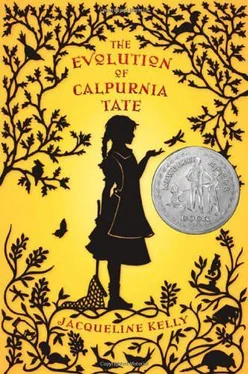Jacqueline Kelly - The Evolution of Calpurnia Tate
Здесь есть возможность читать онлайн «Jacqueline Kelly - The Evolution of Calpurnia Tate» весь текст электронной книги совершенно бесплатно (целиком полную версию без сокращений). В некоторых случаях можно слушать аудио, скачать через торрент в формате fb2 и присутствует краткое содержание. Город: New York, Год выпуска: 2009, ISBN: 2009, Издательство: Macmillan : Henry Holt and Company, Жанр: Детская проза, на английском языке. Описание произведения, (предисловие) а так же отзывы посетителей доступны на портале библиотеки ЛибКат.
- Название:The Evolution of Calpurnia Tate
- Автор:
- Издательство:Macmillan : Henry Holt and Company
- Жанр:
- Год:2009
- Город:New York
- ISBN:978-0-8050-8841-0
- Рейтинг книги:5 / 5. Голосов: 1
-
Избранное:Добавить в избранное
- Отзывы:
-
Ваша оценка:
- 100
- 1
- 2
- 3
- 4
- 5
The Evolution of Calpurnia Tate: краткое содержание, описание и аннотация
Предлагаем к чтению аннотацию, описание, краткое содержание или предисловие (зависит от того, что написал сам автор книги «The Evolution of Calpurnia Tate»). Если вы не нашли необходимую информацию о книге — напишите в комментариях, мы постараемся отыскать её.
The Evolution of Calpurnia Tate — читать онлайн бесплатно полную книгу (весь текст) целиком
Ниже представлен текст книги, разбитый по страницам. Система сохранения места последней прочитанной страницы, позволяет с удобством читать онлайн бесплатно книгу «The Evolution of Calpurnia Tate», без необходимости каждый раз заново искать на чём Вы остановились. Поставьте закладку, и сможете в любой момент перейти на страницу, на которой закончили чтение.
Интервал:
Закладка:
At that moment, Miss Goodacre burst into the room looking flushed and tense. She bustled up to Mrs. Goodacre, and they conversed in an agitated whisper. Mrs. Goodacre turned to the gathering and said, “Minerva has a sick headache, and I’m afraid we must get her home. Such a shame, such a lovely party, but her mother has entrusted her to me for safekeeping. I’m sure you all understand.”
They collected their wraps and made their abrupt good nights while Mr. Goodacre and Harry prepared the buggy. There were many calls of thanks to my mother but no promises of doing it again soon. They disappeared into the night.
Harry looked pensive. “Grandfather, did Miss Goodacre seem all right in the library?”
“She seemed well enough. She did display some interest in the gossamer-winged butterflies. I wish she had shown more interest in the carrion beetle collection, though. They are, after all, exceptionally fine specimens.” He lit up a cigar. “All in all, we had a good talk, I’d say.”
The next day my mother received hand-delivered thankyou letters from our guests and left them out on the dining table to serve as a lesson in good manners to us. The notes were flowery and effusive, except for Miss Goodacre’s, which, although correct, was terse to the point of rudeness.
Two days later, Harry tried to call on her. Her aunt informed him that she was not at home. Three days after that, Miss Goodacre returned to Austin without any notice. Harry found out when he stopped in again and the Goodacres’ maid told him. He came home and took to his room.
There was speculation among my older brothers about whether he would be dosed with cod-liver oil. If not, exactly how old did one have to be to escape it? Was sixteen the cutoff? Fourteen? It was a question of intense interest.
Harry did not get dosed with the stinking oil. Instead, he was drenched with confusion and sadness when his letters to Miss Goodacre were returned unopened. He stumbled about the house for days like one of the walking wounded. It was pitiful. I tended my own stupendous bruise through its lurid healing colors and vowed to resign my commission as a meddler.
Chapter 8
MICROSCOPY
The crust of the earth is a vast museum. . . .
AFTER OUR NARROW BRUSH with the drippy Miss Goodacre, the house stayed discombobulated for weeks as Harry mourned and moped. I did keep my vow not to meddle, too, except for listening at the keyhole when Granddaddy had a talk with Harry in the library a few days later. Something about how the Law of Natural Selection, which always worked in Nature, sometimes inexplicably broke down in Man. Harry did seem a bit better after that, but it still took a while longer to get our old Harry all the way back. I wondered if Harry blamed our grandfather in some part for showing Miss Goodacre his carrion beetle exhibit. If that’s all it took to put her off my brother, she wasn’t worthy of him.
I could tell that Mother was relieved that the wretched Goodacre had gone. My mother’s usual attitude of noncommittal formality toward her father-in-law warmed to something approaching gratitude or maybe even affection. She enquired after his health at dinner and made sure he got the choicest cuts, although I don’t think he noticed.
Harry forgave me. After all, I hadn’t been able to prevent him from having his main chance with Miss Goodacre. I had put on my best party manners and was above criticism. Whatever happened that night hadn’t been my fault; I had given her no cause to flee from the house. And I was his long-standing favorite, his own pet, the one he had carried pig-a-back since infancy. I was flooded with relief to find myself his pet again.
THE SUMMER WORE ON. Sometimes my father would seek advice from Granddaddy about some aspect or other of the farm or the cotton gin. Father found it difficult to tear his own father away from his study of the natural world and make him focus on some point of commerce. Granddaddy had started the business and made it a success, but now he couldn’t be bothered. I thought it odd that my parents couldn’t understand how Granddaddy could have turned his back on his old life. Ever since he ’d told me about his bat, it made perfect sense to me.
“I don’t have that many days left,” he said as we sat together in the library. “Why would I want to spend them on matters of drainage and overdue accounts? I must husband my hours and spend every one of them wisely. I regret that I didn’t come to this realization until I reached fifty years of age. Calpurnia, you would do well to adopt such an attitude at an earlier age. Spend each of your allotted hours with care.”
“Yessir,” I said. “I’ll do my best.” There was no chair for a guest, so I sat on the slanting footstool, supposedly a camel’s saddle. It didn’t look like any saddle I had ever seen, but it had a funny smell and was covered in lots of little beige hairs similar to a Chihuahua’s, so I guess it was real. I never tired of looking at Granddaddy’s things: his brass spyglass from the War; wide, shallow drawers containing rows of desiccated lizards, spiders, and dragonflies; an ornate black cuckoo clock that announced the quarter hours in a droll, cracked voice. A moldering blue rosette with tarnished print that read “Best Fat Stock, Fentress Fair, 1877.” Thick, creamy, parchmentlike envelopes from the National Geographic Society affixed with red wax seals. A carved wooden mermaid holding a pipe rack. Even the bearskin, with its gaping mouth. (The number of times I put my foot in that mouth, I can’t begin to say.) In the locked cabinet on the shelf above the prize book was the gnarly stuffed armadillo, the worst example of taxidermy I had ever seen. Why did he keep this, when all his other specimens were paragons of their species?
“Granddaddy,” I said, “why do you have that armadillo? I bet you could buy a much better one.”
“That’s true, I could, but I keep it as a reminder. That was the very first mammal I stuffed myself. I learned by correspondence course, which I advise against. If this path interests you, I suggest you apprentice yourself to a master. There are subtleties to the art that cannot be gleaned from merely reading a pamphlet.”
“I don’t think I want to learn taxidermy.” I poked at a shelf crammed with fossils and old bits of bone.
“A wise decision,” he said. “The smell alone is enough to discourage most novices from persevering. I have to say in my defense that the next armadillo was much better. So much better, in fact, that I sent it off to the great man himself as a token of the high esteem in which I held him.”
I was hefting a trilobite fossil and half listening. I was fascinated by the ordered ridges of stone that had once been the soft body of a sea animal.
“He had made a study of the South American armadillo, so I thought he should have a North American sample as well. After the armadillos, I took on a bobcat, which I’ll admit now was far too ambitious. I found the facial features quite difficult. I was trying to reproduce the snarl of the cat when it is disturbed in the wild. The poor creature ended up looking as if it had the mumps.”
How many million years old was the stonified creature I held in my hand? What ancient sea had it swum in? I had never even seen the ocean; I could only imagine the waves, the wind, the brine.
“Anyway, as a thank-you, the great man sent me the bottled beast you see on the shelf next to the armadillo. It is my most prized possession.”
“Excuse me?” I said, looking up from the trilobite.
“The bottled beast you see there on the shelf.”
I looked at the monster in the thick glass carboy, with its freakish eyes and multiple limbs.
“It is a Sepia officinalis he collected near the Cape of Good Hope.”
Читать дальшеИнтервал:
Закладка:
Похожие книги на «The Evolution of Calpurnia Tate»
Представляем Вашему вниманию похожие книги на «The Evolution of Calpurnia Tate» списком для выбора. Мы отобрали схожую по названию и смыслу литературу в надежде предоставить читателям больше вариантов отыскать новые, интересные, ещё непрочитанные произведения.
Обсуждение, отзывы о книге «The Evolution of Calpurnia Tate» и просто собственные мнения читателей. Оставьте ваши комментарии, напишите, что Вы думаете о произведении, его смысле или главных героях. Укажите что конкретно понравилось, а что нет, и почему Вы так считаете.












